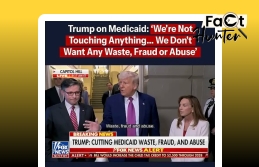The claim:
President Donald Trump and his supporters argue the One Big Beautiful Bill (OBBB) “does not cut Medicaid” and only targets non-compliant recipients and improves efficiency without harming coverage for legitimate beneficiaries:
Fact-check:
OBBB would drastically reduce the number of Americans qualified for Medicaid, a health program jointly run by the states and the federal government to help low-income individuals and families.
The Congressional Budget Office (CBO) projects the bill will cause roughly 16 million Americans to lose coverage by 2034. This is due to a combination of new rules in the bill including:
- Mandatory work requirements: 80 hours/month for able-bodied recipients
- More frequent eligibility checks: every 6 months instead of annually
- Tighter income verification: added co-payments, and caps on state-directed provider payments.
Several institutions including Georgetown University and the Center for American Progress estimate OBBB as passed cuts Medicaid by approximately $1 trillion over the coming decade – the largest cut in history to Medicaid. As a result, states will receive significantly less federal support and bear more financial burdens, forcing them to reduce eligibility, cut provider payments or limit services.
Over the next ten years, hospitals are expected to see a nearly $665 billion cut in Medicaid payments—a reduction of 18.2%, according to an analysis by Manatt Health, a consulting firm that advises states and healthcare providers on Medicaid policy. At the same time, uncompensated care costs are projected to rise by more than $84 billion by 2034, based on findings from America’s Essential Hospitals, which represents around 350 hospitals across the country.
What it means:
As Medicaid mainly helps the low-income population, a cutdown would have a direct impact on the have-nots and their health. According KFF, a health-policy nonprofit, hospitals in 30 states will likely see reductions in state-directed payments, which have been a lifeline that helped many underfunded, rural hospitals to stay afloat financially when Medicaid payments fall short as is often the case. Taking that away, as OBBB would do, means more closure of these hospitals, leading to healthcare professional losings their jobs and less access to them for patients.
Conclusion:
While Trump frames the bill as a cleanup of inefficiencies, independent analysis shows it makes deep structural cuts to Medicaid funding and access. The claim that no one loses coverage, or access is at best misleading, given that millions are projected to be dropped from the program.






